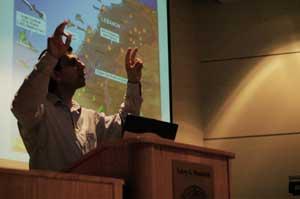
Daniel Joe
Akram Khater, director of the international studies program and an associate professor of history, gave an hour-long lecture about the Hezbollah-Israeli conflict in the Middle East on Centennial Campus Wednesday evening.
The lecture, titled “A Symptom of Larger Problems,” was the first of a series hosted by Centennial Campus’ “In The Know,” a program designed to bring students and teachers together to become more informed about any issue a lecturer may find important.
Violent conflict between the Hezbollah and Israel has been going on since the Hezbollah’s birth in the 1980s, but recently it became a close-to-home issue this past summer when war between the two states required U.S. intervention, according to Khater.
Khater quickly detailed the history of the Hezbollah itself, addressed the start of its animosity with Israel, and offered his own ideas of possible solutions to the Middle Eastern problems. He concluded his lecture with a question-and-answer session for his diverse audience, allowing attendees to freely ask questions about his speech and allow them to express their own personal opinions.
The Hezbollah is a military unit based in Lebanon. Created in 1983 by radical youth tired of Israeli occupation in their country, the Hezbollah is often viewed simply as a band of bloodthirsty terrorists. However, according to Khater, this is a misunderstanding.
“They are the most active, the most articulate and the most effective military unit in the Middle East,” Khater said. “They are simply a resistance movement for the oppressed against the oppressor.”
Students have different takes on the conflict between the Hezbollah and Israel.
Mike Lev, a junior in international studies at UNC-Greensboro, is originally from Jerusalem.
“I had friends I grew up with on the border fighting for Israel, so I was obviously backing them,” Lev said. “But if Israel had acted more quickly, maybe they would have been able to completely disarm Hezbollah.”
Sara Alayli, a junior in biology and microbiology, spent time in the Middle East this past summer visiting friends.
“I don’t support it, and I think that both sides could have done something to prevent it,” Alayli said about the war. “It has led to the loss of a lot of innocent lives, and many people who survived the bombs still have to deal with the fact that they are homeless, and that their future and their hopes are destroyed.”
Alayli’s visit was around the time when the first bombs began dropping.
“I just wish it hadn’t happened… it ruined my summer,” Alayli said.
The next lecture provided by “In The Know” will be Steve Kelly’s take on bio-fuels, held in the MRC Auditorium on Dec. 6.